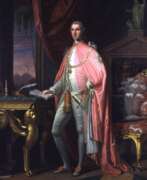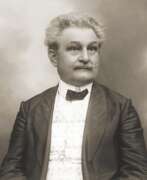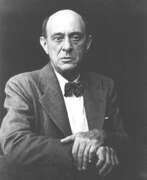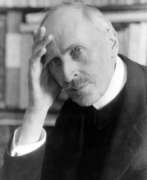Musicologists 19th century


Sir William Douglas Hamilton was a British diplomat, archaeologist and volcanologist, a famous collector, and a Fellow of the Royal Society of London.
He served as British Ambassador to the Kingdom of Naples from 1764 to 1800, but most importantly, he was a passionate researcher of history, art and natural sciences and was a member of the Society of Dilettantes, established for the purpose of studying ancient art.
In Naples, Hamilton amassed a unique collection of antique vases and published an illustrated book about them. In parallel, Sir Hamilton studied the volcanoes Vesuvius and Etna, local volcanic and seismic activity, and the causes of earthquakes in the Neapolitan territory. As a corresponding member of the Royal Society, he sent the results of his research to London. His publications were very valuable for the time.


Leoš Janáček, birth name Leo Eugen Janáček, was a Czech composer and musicologist, folklorist, publicist and teacher.
Janáček was a singer in Brno, and studied at the Prague, Leipzig and Vienna Conservatories. In 1881 he founded the Collegium of Organists in Brno, which he directed until 1920. From 1881 to 1888 he directed the Czech Philharmonic Orchestra, and in 1919 he became professor of composition at the Prague Conservatory.
Janáček was deeply in love with national music, collecting folklore and publishing the journal Musical Pages. He was inspired by Moravian and other Slavic music, including Eastern European folk music, to create an original modern musical style.
In his early period of creativity, Janáček was strongly influenced by the musical style and aesthetics of his friend Dvořák. His first opera, Šarka (1887-88), was a romantic work in the spirit of Wagner and Smetana. In his later operas he developed his own distinctly Czech style, built on the intonations of his native speech and folk melodies. Janáček's most important operas are Jenůfa (1904) and Her Foster Daughter, which established the composer's international reputation; The Case of Macro Pulos (1926), From the Dead House (1930), and others. Most of Janáček's operas have been staged in Czech.
Janáček visited Russia three times, and his interest in Russian language and literature resulted in the opera Katya Kabanova (1921) and the orchestral rhapsody Taras Bulba (1918). Janáček also wrote a number of instrumental chamber works. The world-famous composer spent most of his life in Brno, where the vast majority of his works were performed for the first time. Today, Janáček is the most frequently performed Czech opera composer in the world.


Arnold Schoenberg, real name Arnold Franz Walter Schönberg, was an Austrian and American composer, representative of musical expressionism, teacher, musicologist and conductor.
Schoenberg came from a Jewish family and began studying the violin at the age of eight and later the cello. While working as a bank clerk, he simultaneously studied composition with Alexander Zemlyansky (1871-1942) and soon wrote his first string quartet (1897) to acclaim. With the help of Richard Strauss, he obtained a teaching position in Berlin, and lived for a time in two cities. In 1904, Alban Berg and Anton Webern began studying with Schoenberg, and this largely determined their future artistic careers.
Around 1906, through much experimentation, Schoenberg came to the conclusion that tonality should be abandoned. He created new methods of music-making and composition involving atonality. In the subsequent period of "free atonality" from 1907 to 1916, he composed the monodrama "Reason", "Five Orchestral Pieces", "Pierrot Lunaire" and other works.
In 1933, due to the rise of National Socialism in Germany, Schoenberg was expelled from the country and emigrated to the USA, in 1941 he took American citizenship and taught at the University of California at Los Angeles until 1944. The works of this period demonstrate the composer's ever-increasing skill and freedom in the use of the 12-tone method.
Although Schoenberg was never accepted by the general public, he nevertheless had a significant influence on 20th century music, being the founder of the New Viennese School of Composition.

